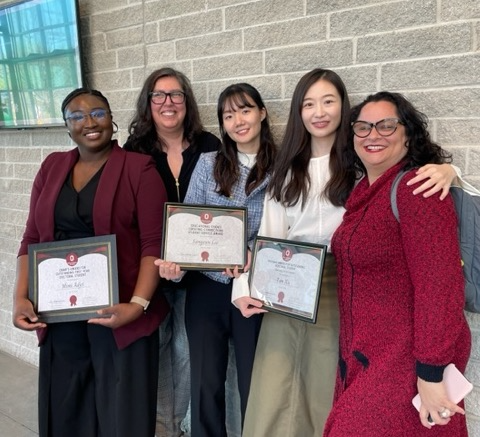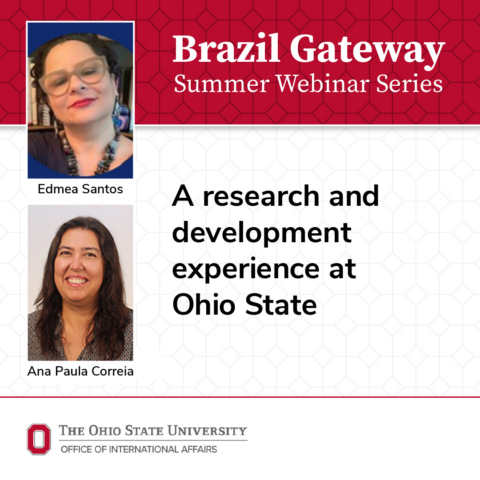Written by Ana-Paula Correia and Edméa Santos, October 13, 2023
The Center on Education and Training for Employment (CETE) has a history of fostering international collaboration and bringing diverse research perspectives to the forefront. Recently, we had the privilege of hosting a visiting scholar from the Federal Rural University of Rio de Janeiro, Brazil, Edméa Santos, and the results of this collaboration have been nothing short of remarkable. Edméa Santos worked closely with the Center’s Director, Ana-Paula Correia, on research endeavors to advance online and digital learning.
In this segment, we’ll delve into the transformative experience of this visit, which led to the publication of a journal article, a book chapter “in press,” and an even stronger bond with our partners at Ohio State’s Brazil Gateway. Moreover, we will highlight the profound contributions from perspectives outside North America in addressing critical issues and advancing online learning. The following are accounts of both researchers about this experience.
A Transformative Collaboration with CETE: Expanding my Research Horizons
By Edméa Santos
My arrival at CETE in March 2023 really opened my research horizons. The Center is dedicated to translating research into actionable practices, cultivating a skilled workforce, and fostering thriving communities that prioritize well-being and economic prosperity. This unrelenting commitment to bridging the gap between research and real-world impact permeates every aspect of CETE, igniting a collective drive to effect positive societal change through excellence in research and practice.

As a faculty advisor for master’s and Ph.D. students in the area of Education in Cyberculture, I embarked on this visit with a dual purpose: to immerse myself fully in the life of CETE and to engage with researchers from the College of Education and Human Ecology who specialize in qualitative educational research methodologies.
My research journey thus far has been anchored in the development of a research methodology that I named Research-training in Cyberculture or Cyber-research-training. This qualitative approach seamlessly integrates training contexts into academic research practices. Within this framework, the digital network serves as both a research field and a tool for the production of research material within cybercultural contexts. Our research focuses on virtual learning environments, social networks, and digital products at large.
To me, cyberculture transcends being merely an “evolution” of distance education practices; it is a phenomenon in its own right. My research group, the Teaching and Cyberculture Research Group (GPDOC) at the Federal Rural University of Rio de Janeiro, researches interactive, collaborative curricular designs, hypermedia, and creative online education solutions.
One of the most transformative aspects of my CETE experience was witnessing experiential e-learning in action, masterfully designed, developed, and delivered by my colleague, Ana-Paula. Based on my reflections and observations during my stay, I had the privilege of leading the authorship of a journal article for a prestigious Brazilian academic journal, Interfaces Científicas – Educação.
Titled “Educação on-line na pós-graduação stricto sensu: O caso da unidade curricular ‘Applied Instructional Design’ do programa de pós-graduação on-line em tecnologia educativa da Universidade do Estado de Ohio nos Estados Unidos,” [Online education in postgraduate stricto sensu: The case of the course “Applied Instructional Design” in the online postgraduate program in educational Technology at The Ohio State University in the United States], this article critically examined the challenges and opportunities of project-based pedagogy when embedded in an online course. Note that “Stricto Sensu” is a Latin term used in academic contexts to refer to postgraduate programs that are research-oriented, typically including master’s and doctoral programs.
By incorporating international perspectives and viewpoints, I gained a significantly more comprehensive understanding of the ever-evolving landscape of online education and digital learning. This collaboration has not only broadened my horizons but also reinforced the idea that true progress in the field of education knows no geographical bounds. My visiting scholar period at CETE was nothing short of transformative, both personally and professionally. The synergy between CETE’s commitment to excellence and my research aspirations has resulted in an enriching experience that will undoubtedly continue to shape my work as I move forward.
Contributions to Research and Problem Solving: Advancing Online Learning and the Use of Emerging Technologies
By Ana-Paula Correia

My partnership with Edméa Santos began on a bright autumn day in Lisbon back in 2013. We were both visiting scholars at the Portuguese Open University (Universidade Aberta), and since that initial meeting, our collaboration has flourished. Over the years, we’ve co-authored research papers, engaged in countless academic discussions, presented at conferences together, and even had the pleasure of visiting each other’s universities.
In 2023, Edméa returned to The Ohio State University as a visiting scholar at CETE. Her journey began virtually in January and extended until the end of June 2023. In March, she arrived in Columbus, Ohio, to complete the in-person component of her visit.
Edméa Santos is a full professor of Education in the Graduate Program in Education at the Federal Rural University of Rio de Janeiro, Brazil. She is a leader in different research associations in Brazil, such as ANPED Special Interest Group on Education and Communication, and the Vice-president of ABCIBER.
Having the privilege of drawing upon Edméa’s 25 years of experience was an invaluable opportunity for pushing the boundaries of emerging technologies at CETE. The Center’s extensive expertise in online learning and digital products has established it as a beacon for professional learning—a fact underscored by its recent award by the International E-Learning Association.
“A research and development experience at Ohio State,” invited presentation to Brazil Gateway Summer Webinar Series (August 19, 2023).
Frequent and extensive conversations with Edméa confirmed the many challenges we strive to address within the realm of online learning in North America. One key challenge is creating experiential learning opportunities within online programs. Today’s online learners seek experiences that go beyond reading and writing; they are hungry to apply what they learn in real-world contexts. This motivation was one of the driving forces behind my project-based approach to online teaching, wherein my students collaborate with real-world clients to solve authentic educational challenges, all at no cost. These discussions served as the catalyst for our journal article, but our collaboration didn’t stop there.
We ventured into another hot topic in educational technology—generative Artificial Intelligence (AI) in education. Edméa and her colleagues in Brazil are working on an edited book titled “ChatGPT e Educações na Cibercultura” [ChatGPT and Education in Cyberculture]. Due to CETE’s leadership in AI’s applications for learning and development, we co-authored a chapter for her upcoming book. This collaboration emphasizes the benefits of embracing diverse perspectives to confront global educational challenges.
Edméa visit exemplified the significance of incorporating viewpoints from outside North America when addressing critical issues and advancing online learning. Her insights into the Brazilian education system and her experiences with online education in Brazil injected new dimensions into my research group on Learning & Experience Design. By juxtaposing these insights with our North American context, we cultivated a deeper understanding of the challenges and opportunities within the realm of educational technology.
Last but not least, Edméa’s visit also strengthened the ties between CETE and Ohio State’s Brazil Gateway. The Brazil Gateway builds upon Ohio State’s rich partnership and strategic engagement history with Brazil, spanning over 50 years. It focuses on four key areas: students, research, alumni, and partnerships. Located in São Paulo, Brazil, the largest city in the Southern Hemisphere, the Gateway offers a vibrant, multicultural atmosphere and is the economic powerhouse of Latin America. As a result, our partnership culminated in an invited presentation for the Brazil Gateway Summer Webinar Series.
This wealth of experiences has solidified CETE’s commitment to promoting cross-border cooperation, fostering cultural exchange, and expanding our network of global collaborators. It underscores the profound impact of international partnerships in shaping the future of research and education. As a Center, as we look ahead, we remain steadfast in our dedication to nurturing global partnerships and furthering the horizons of research and development.
